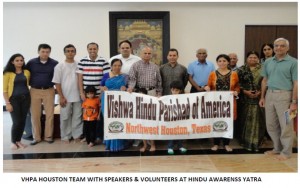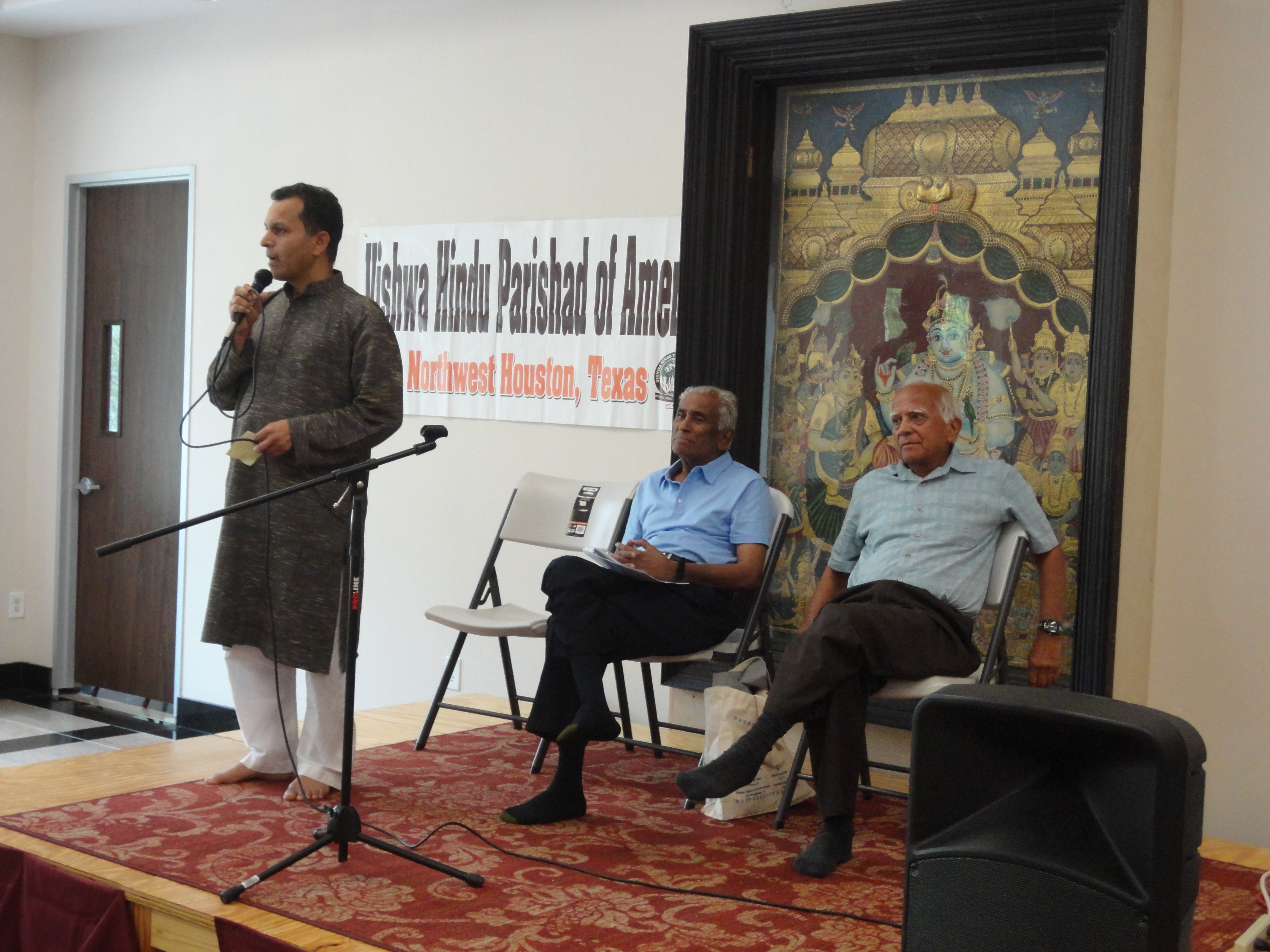Hindu Temple of Woodland Hosts Second Annual Hindu Awareness Yatra organized by VHPA
PRESS RELEASE
AUGUST 26 2013
VHPA HOUSTON TEAM WITH SPEAKERS & VOLUNTEERS AT HINDU AWARENSS YATRA
VHPA Houston Chapter organized Second Annual Hindu Awareness Yatra in Houston, TX at Hindu Temple of Wood-land. The event began with Ekatmata Mantra (Universal Prayer) and Sangathan Mantra (Organization Unity Prayer). Suveena Gulani (Secretary—Hindu Temple of Woodland) informed the audience on activities of Hindu Temple of Woodland and its projects in the area of education, youth development and religious services. Pravin Vyas (President, VHPA Houston) spoke on history, vision and mission of VHPA, and its journey and social activities in Houston area towards Hindu awareness and em-powerment.
Dr. TRN Rao, an eminent scholar on Hinduism and past president of Hindu University of America, educated the audi-ence on ‘Dharma and Religion’ and Hindu samskaras (traditions) one practices in daily life relevant to current times. He cited colonization and subsequent brainwashing of Hindus by colonial era literature as the main reason for forgetting rich history of India. He referenced Swami Vivekananda (Practical Vedanta) whose philosophy preaches selfless service for Dharma, rather than expecting every solution (of social problem) from God, one should stand up to the cause and do something, like the way Lord Hanumana did in helping Lord Ram in victory on evil. He mentioned that ‘caste’ is a foreign word and doesn’t match with its Vedic Sanskrit word ‘Varna’ which is not birth based but based on individual approach towards Karma (action) and Guna (quality). For example Ved Vyasa who wrote Mahabharata was a ‘Sudra’ but later gained knowledge and educated to become a Brahmin. Similarly he gave many examples where people from one varna migrated to another based on Karma. In his entire speech he informed audience on the past 1200 years of ideological effects Hindus suffered as a result of Islamic in-vasion and British Raj and the way forward to realize the rich heritage, culture and values Hindu dharma has.
L-R: VHPA Houston president Shri. Pravin Vyas with speakers Shri. Arun Sharma, Dr. TRN Rao and Shri. Dilip Mehta
Shri Dilip Mehta (President, Hindu Congress of America – HMSA) spoke on ‘Implementing Dharma in Daily life’. He talked on Rakshabandhan and its importance in Hindu-isms in defining men’s outlook towards women in Hindu society. He emphasized on the urgent requirement to prevent distortion of Dharma by some religious scholars. For example there are several Samskrit half-statements we often use as if it were full statements such as Ahimsha Paraamo Dharma, we need to correct such half-statement’s with half-knowledge. For Gandhiji, Ahimsa was Paramo dharma. But he never thought, Himsha (violence) is also dharma/noble to protect the righteous. We the followers of Sanatan dharma value Ahimsa, but we must know when Himsa (violence) is re-quired to protect dharma and righteous people. Lord Sri Krishna said in the Bhagavad Gita (BG 2-37): so the com-plete statement is
Ahimsa paramo dharmaha, Dharma himsa tathaiva
(‘Non-Violence is the greatest Dharma, so too is all right-eous violence to protect Dharma’)
Similarly he mentioned that when people say ‘Unity in Diversity’, it’s again a way to differentiate Hindus on the basis of language, caste, sect etc. He mentioned that Hin-du Dharma (Sanatan Dharma) is a logically composed unified system, there is no diversity. He said, “If you un-derstand the true meaning of Hindu scriptures there will be no confusion and delusion in understanding right-eousness and unrighteousness actions. “
Shri Arun Sharma spoke on ‘Karma Yoga and Hindu Activism’. First he educated the audience on four types of Yoga, towards liberation & self realization. He mentioned four major challenges Hindus face today. First is absence of Karma Yoga. He cited Bhagavad Gita verse which mentions that when Dharma is threatened, Karma Yoga (Path of action) is the only option. For example, Lord Rama and Arjuna chose the path of Karma Yoga in Ramayana and Mahabharata respectively. Similarly, Swami Vive-kananda also chose Karma Yoga and awakened people to the reality of Dharma. He mentioned that though all Yoga streams Karma Yoga (Moksha via Action), Bhakti Yoga ( Moksha via Devotion), Jnana Yoga ( Moksha via Knowledge) & Raja Yoga (Moksha via meditation) aim to achieve liberation (Moksha), individual liberation is not possible if Dhar-ma is absent in society. Currently Hindu Dharma is threatened across the world so just focusing on self enlightenment and individual growth will not help in protecting Dharma. Collectively, uplifting Hindu society by creating awareness and removing ignorance should be the goal for which involvement in social organizations alongside is recommended alongside devotion to their deity / God (Temple). The second challenge is the way educational literature, relevant to Hinduism and Hindu histo-ry, in US has been incorrectly presented for which organizations like HAF, HEB (Hindu Education Board) are reviewing and giving recommen-dations to school authorities and book editors. Third challenge is the identity crises some Hindus face in America. Because of ignorance many Hindus remain in confused, inferior and delusional state when it comes to practicing & defending Dharma values and principles. Lastly, he stat-ed that in recent years many Hindu organizations in US have incorpo-rated their own agenda and mission, but he suggested such organiza-tions should unite for common causes when Dharma is threatened.
Rahul Chandra (Coordinator—NW Unit of VHPA) spoke on the significant role of Hindu social organizations like VHPA, HSS, HAF, HMSA etc. in America and how they are dedicat-ed to collectively protect and sustain Dharma via Karma Yoga. Hindus should volunteer for these organizations in whatever capacity—as a volunteer, office bearer or donor and not just expect direct solutions without participation—become a Karma Yogi. These Hindu organizations are fo-cused for specific causes concerning Hindus on socio-educational and religious spectrums. Some are creating awareness on contemporary social issues and problems and solution approach, some are educating Hindus on Dhar-ma— Tradition, Culture, Values and Ethics and some are involved in advocacy. Thus for different issues, today, Hin-dus in USA have relevant organizations to address them— the need is for Hindus to come forward and support these organizations.
Shalini Kapoor (Secretary—NW Unit of VHPA) thanked audi-ence, speakers and volunteers for their participation, sup-port in making Hindu Awareness Yatra a successful and en-lightening event.
Hindu Awareness Yatra is a national project of VHPA under which em-inent scholars & intellectuals are invited by chapters to speak on con-temporary topics concerning Hinduism in America and worldwide.
HOUSTON : E-mail: coord_NorthHouston@vhp-america.org Phone: 1-(800)-749-5118 Website: http://vhpahouston.wordpress.com
NATIONAL: E-mail: office@vhp-america.org Phone: (732) 744 0851









